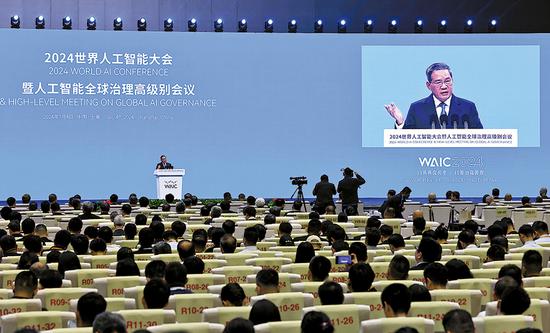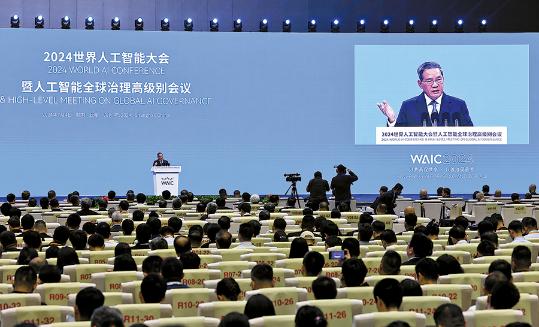China urges consensus on global AI governance

Premier Li Qiang delivers a speech at the opening ceremony of the 2024 World AI Conference and High-Level Meeting on Global AI Governance in Shanghai on Thursday. (WANG JING/CHINA DAILY)
China is ready to work with other countries around the globe to promote artificial intelligence to better serve global development and the well-being of humanity, moving toward a brighter intelligent future, Premier Li Qiang said on Thursday.
Li made the remarks in Shanghai when addressing the opening ceremony of the 2024 World AI Conference and High-Level Meeting on Global AI Governance.
With the theme "governing AI for good and for all", the three-day event has gathered government officials, heads of international organizations, business leaders and researchers from around the world.
The meeting followed the United Nations General Assembly's unanimous adoption on Monday of a resolution on strengthening international cooperation on AI capacity building that was proposed by China and co-sponsored by over 140 countries.
Li highlighted the significant progress in AI development since the inaugural World AI Conference in 2018, and acknowledged the new challenges AI poses in areas such as law, security, employment, ethics and morality.
He underlined the urgent need for in-depth discussions and consensus-building among nations on global AI governance, and called for collective efforts to seize opportunities and address challenges.
It is important to strengthen partnerships on basic research and talent exchanges and collectively safeguard the security and stability of industrial and supply chains, he said.
The premier emphasized the importance of promoting inclusive development to bridge the AI development gap, and urged joint actions to create an open, fair and nondiscriminatory environment for AI development.
Alignment of development strategies, governance rules and technical standards in the AI sector should be strengthened, and governance frameworks and standard specifications with broad consensus should be formulated to ensure safe, reliable and controllable AI development so that it is always in line with the fundamental interests and values of humanity, Li said.
Around 1,000 domestic and international representatives attended the opening ceremony, including Luis Roberto Barroso, chief justice of the Supreme Court of Brazil, Dilma Rousseff, president of the New Development Bank, and Gerd Muller, director general of the UN Industrial Development Organization.
The event adopted the Shanghai Declaration on Global Governance of Artificial Intelligence. The UNIDO Global Alliance on AI for Industry and Manufacturing Center of Excellence, which will be based in Shanghai, was also launched at the opening ceremony.
Sassine Ghazi, president and CEO of Synopsys, a global leader in semiconductor electronic design automation, silicon intellectual property and application security, said the pace of AI innovation must be carefully balanced with the need for responsibility in how AI is developed.
"The best approach to achieve the balance is to work together globally," Ghazi said. "Global collaboration will enable people worldwide to benefit from the incredible advances that AI is bringing while ensuring that those amazing new capabilities are deployed responsibly."

